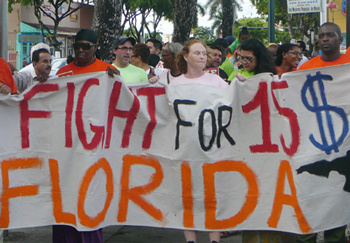

Vol. 78/No. 46 December 22, 2014

|
| Militant/Naomi Craine |
| Miami McDonald’s workers who joined strike for $15 an hour and a union hold banner Dec. 4. |
Twin Cities marchers were joined by representatives of a group of personal care attendants, who care for disabled people on Medicaid in their homes. Twenty-seven thousand of them won union representation by the Service Employees International Union in August.
Just one week after nationwide Black Friday actions by Walmart workers demanding $15 an hour and full-time work, thousands of McDonald’s, Burger King, Dunkin’ Donuts and other restaurant workers and their supporters held “Fight for $15” strikes and rallies in 190 cities across the country, 40 more than in similar protests in September.
Some of the fast-food workers had taken part in the rallies organized by OUR Walmart, a group of workers at the retail giant, and Walmart workers joined in some of the Dec. 4 protests. “Today went really well. Our main point is that the fight for $15 and a union is growing,” Erica Concepcion, 20, who works at Dunkin’ Donuts for $8.50 an hour in Boston, told the Militant. “You shouldn’t have to work two or three jobs in order to survive.”
The actions drew in participants from beyond hamburger and donut chain workers to convenience store, airport and home health care employees. A national “Home Care Fight for $15” was launched in September. And the protests were reinforced by the explosion of opposition to grand jury decisions to not indict the cops who killed Eric Garner in Staten Island and Michael Brown in Ferguson, Missouri.
The growing protests captured the attention not only of millions of workers who earn the minimum wage of $7.25 per hour, but of the propertied rulers who are watching it spread closely.
“Employees From Increasingly Varied Workplaces Demand Higher Minimums,” the Dec. 4 Wall Street Journal reported. “The people in Ferguson are fighting for their rights, just like the people in fast food are fighting for their rights,” Carlos Robinson, 23, a Burger King cook in St. Louis who gets $7.75 an hour, told the big-business daily.
In Miami some 100 demonstrators, including Walmart workers and airport food workers, marched through the heart of the Little Havana district. When police prevented them from entering a McDonald’s restaurant, the crowd chanted, “I can’t breathe.” This was what Eric Garner repeated numerous times as he was being choked to death by New York police in Staten Island.
“We’re living paycheck to paycheck,” Janice Williams, 54, a school cafeteria worker married to a McDonald’s employee, told the Militant in Atlanta, where some 80 fast-food and home health workers, as well as members of the Coalition of Black Trade Unionists and Concerned Black Clergy, marched. “When we get this $15, we can finally take a vacation. As it is now, we can’t even pay our bills.”
Veterans of the campaign that began two years ago are organizing strikes at some of the fast-food stores and standing up to the intimidation from the bosses.
“I’ve been on four or five of these strikes, and each time they threaten me with firing or they write me up,” Ana Mosquera, a Wendy’s worker who gets $7.25 an hour and brought a co-worker to join a 100-person action in Houston, told the Militant. “But so far I’m hanging in there.” The marchers, including SEIU Local 1 office cleaners who struck for higher wages in 2012, held rallies in English and Spanish outside of Taco Bell and McDonald’s.
In 2012 bosses pooh-poohed the demand for $15 an hour, but the uptick in working-class and social resistance today, reinforced by newfound confidence from a modest increase in jobs in the U.S., is making it a watchword. “A wage of $15 per hour is now the battle cry for low-wage workers nationwide,” said a Dec. 4 article in Fortune, a U.S. business magazine.
The minimum wage, which has been $7.25 since 2009, is more than some workers are paid. A Labor Department study released on the day of the fast-food protests found “pervasive minimum wage violations in California and New York, with more than 300,000 violations in each state monthly.”
Helen Meyers in Minneapolis, Kevin Dwire in Boston, Naomi Craine in Miami, Cindy Jaquith in Houston and Rachele Fruit in Atlanta contributed to this article.
Related articles:
Quebec marches protest cuts in gov’t services, attacks on labor
On the Picket Line
Turkish miners fight for wages, job safety
Massey Energy boss indicted in 2010 W.Va. coal mine blast
Front page (for this issue) |
Home |
Text-version home